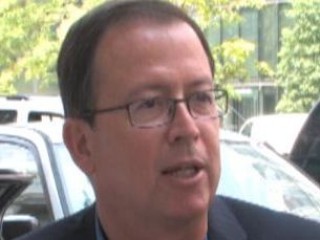
Brian Becker biography
Date of birth : -
Date of death : -
Birthplace : Texas, U.S.A.
Nationality : American
Category : Arts and Entertainment
Last modified : 2011-09-14
Credited as : media chief, Clear Channel Entertainment, Power 300
0 votes so far
Becker was born in the late 1950s, and grew up in Houston, Texas. In 1966, his insurance salesperson father, Allen, formed PACE Entertainment with a partner to operate the annual boat show in Houston. The company soon branched out to demolition derbies and motorcycle races, and during his formative years Becker and his siblings enjoyed backstage access to celebrities like daredevil motorcyclist Evel Knievel. Becker's interests were of a more college track variety, however: he led his Bellaire High School debate team to a 1975 Texas championship, was active in the Jewish service organization B'nai Brith, was an avid baseball and tennis player, and worked during the summer as an intern in the offices of the publicity firm that handled PACE events.
PACE entered the music business after winning the contract for a 1975 Houston concert by the British rock band the Who, then at the height of their fame. Not long afterward, Becker enrolled at Stanford University in California, where he honed his concert promotion skills by bringing such acts as Parliament/Funkadelic to campus. After graduating in 1979, he spent a year in England working for the marketing department of Britrail, the British national passenger rail service, and then returned Stateside to begin business school at the University of California at Los Angeles.
Armed with his M.B.A., Becker headed back to Texas in 1982 and began working for PACE's recently launched theatrical division. His office helped make regional tours of hit Broadway shows standard fare in many American cities. It was an innovative move by PACE management at the time, for few Broadway producers wanted to work with regional promoters. Their first shows in Memphis and Nashville Hello, Dolly! with Carol Channing and a King and I production that starred Yul Brynner fared poorly, and PACE lost some $400,000. "Even today that's a big loss, but back then it was a huge loss," Becker recalled in an interview with Houston Chronicle writer Clifford Pugh. "But we paid the bills. In New York, the general managers and producers said, 'Wait a second, these guys in Texas paid their bills. We ought to sell them some more dates.'"
Becker helped PACE become the leading producer of regional theater events in several American cities, and urged his father and the other executives to make investments into building their own venues for musical events. He had noticed that open air amphitheaters often did well, despite their limited summer weather seasons, and recognized that they were relatively cheap to build and operate. In 1994, he became president and CEO of PACE Entertainment, and helped negotiate a deal with SFX Entertainment that gave the company dominance in the newly emerging national network for live event promotions. From 1998 to 2000 he served as an executive vice president at SFX, and was given another top job when Clear Channel Communications bought SFX for $4 million in 2000.
Since then, Becker has served as chair and CEO of Clear Channel Entertainment, the company's live event division. It produces the immensely successful tours of acts from Ozzfest to Madonna's "Drowned World" tour, and is still involved financing such theatrical productions like the smash New York musical The Producers. Becker even appeared onstage at the 2001 Antoinette Perry awards ceremony to accept the Tony for Broadway's best musical of the year. Some assert that the larger, highly profitable Clear Channel Communications, with its ownership of radio stations across the country, is too dominant a player in the entertainment business. A Clear Channel show that Becker is promoting, for example, enjoys tie ins in various markets that are home to the 1,200 radio stations that Clear Channel owns.
Becker dismisses charges that Clear Channel wields too much power and is only interested in working with established, money making acts. "We'll do some 8,000 concert events this year," he told Hollywood Reporter journalist Tamara Conniff, and noted that nearly three quarters "of those events are being done in theaters and being done in clubs where we make little to no money or lose money. We do it because we are providing a forum for new and emerging artists to be exposed and develop their careers." Becker was also enthusiastic about his company's new "InstantLive CD" program, in which concert-goers can immediately purchase a CD of the performance after the last encore.
Under Becker's guidance, Clear Channel Entertainment is moving into Europe as well, promoting the popular music festivals there that are a staple of the summer season. Again, his company faced charges of using its brand
name power to gain a foothold. "We are the largest, and by definition that creates a rallying cry for those that want to be the largest," Becker reflected in an article by Billboard 's Ray Waddell. "I will tell you this: It's not based upon the merit of how we operate. There are people that are going to say, 'Big is bad.' And it's not going to matter why or how, it's just going to be a matter of fact."
Becker is married to a former bond broker whom he met when she interviewed for a job with PACE in 1996. They have four children. His father, Allen, still serves as a consultant to the company, though officially retired, and his brother, Gary, is also an executive with Clear Channel. "I get a tremendous amount of enjoyment out of doing my job well," Becker told Pugh in the Houston Chronicle. "There is truly nothing like being part of the universe based upon the creativity of the human spirit. There's nothing like the live experience."
















